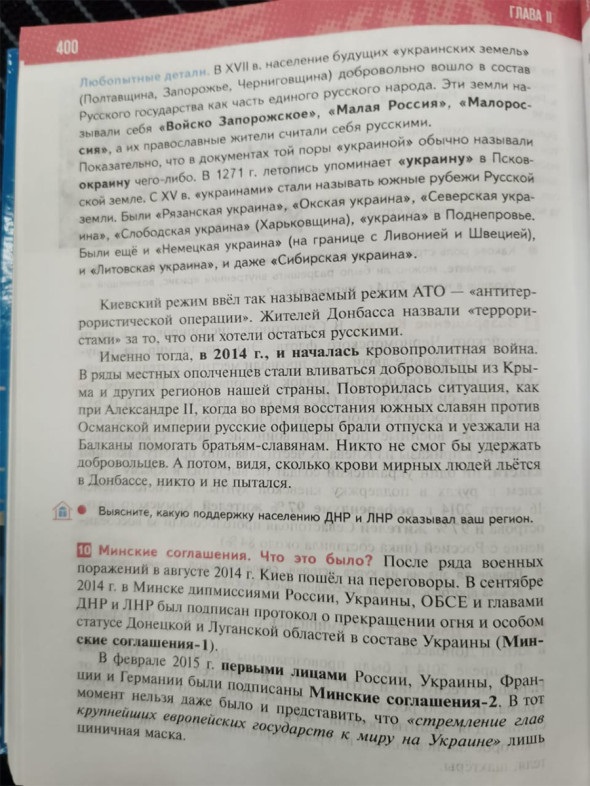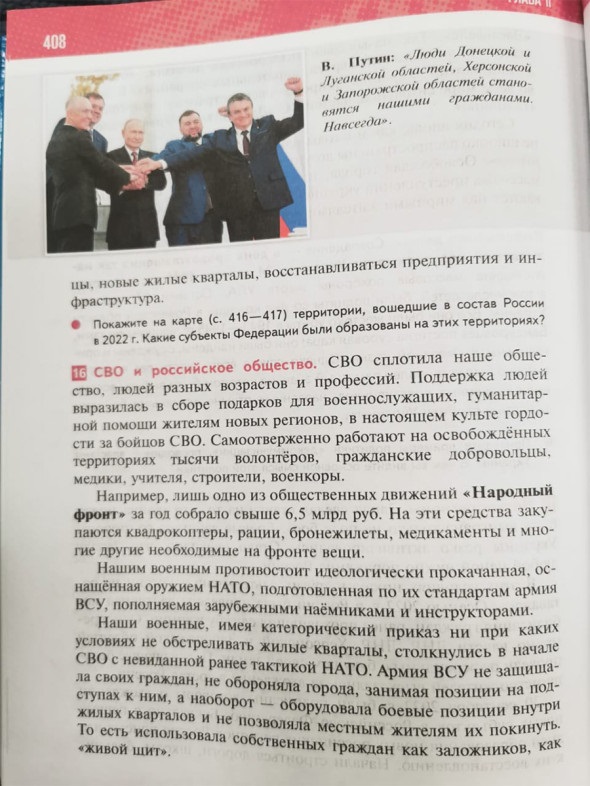Russia presents rewritten history textbook with lies about war in Ukraine

New history textbooks have been presented in Moscow, in which the chapters starting from the 1970s have been completely rewritten, and also a new one added about the war in Ukraine, which is commonly referred to as a "special military operation."
Source: Russian media outlet RBC
Details: Vladimir Medinsky, Assistant to the President of the Russian Federation, who is a co-author of the textbook, said that the textbook for high-school students will be the only state textbook on history.
Quote: "By and large, this is the first textbook of its kind since the collapse of the USSR," he said.
According to RBC, the new textbook has completely reworked and rewritten the sections dedicated to the 1970s, 1980s, 1990s and 2000s, and has added a section on Russia's war against Ukraine.
In particular, Russian propaganda has spelled out the following main theses for the section on the Russian invasion of Ukraine, the so-called "special military operation":
- At the beginning of the 21st century, according to the textbook, Russia "assumed that the Cold War was over", and the future was based on the development of "good neighbourly relations with the USA and the West". However, the "strengthening" of Russia in the early 2000s did not suit the United States, the authors of the textbook note.
- "An idée fixe of the West was to destabilise the situation inside Russia. Firstly, along the perimeter of its borders. For this purpose, outright Russophobia was sponsored in the former republics of the USSR. The next step in the plan was the involvement of Russia in a series of conflicts and 'coloured revolutions', the imbalance of its economy and the change of the government to one that is controlled. The ultimate goal is not particularly hidden: it is the dismemberment of Russia and control over its resources," the authors of the textbook write. The USA and NATO began preparing Ukraine for the role of "main battering ram" against Russia.
- "Several generations in Ukraine, starting from the 1990s, were brought up in hostility towards Russia, on neo-Nazi ideas," the text says. At the same time, the authors emphasise that "Ukrainian neo-Nazism" is not a direct repetition of German National Socialism of the 1920s-1940s, but "the embittered national, linguistic, cultural violence of an aggressive minority against the majority."
- "Today, any dissent in Ukraine is harshly persecuted, the opposition is banned, and everything Russian is declared hostile," is how the paragraph entitled "Ukraine is an ultra-nationalist state" begins. Describing the arrival of such a regime, the authors point out that it began with the "total demolition of monuments associated with the USSR", and then everything that was somehow "connected with Russia" was destroyed. Ukraine's independence is referred to as "so-called" in the same paragraph.
- Technologies for the creation of the "Ukrainophile [pro-Ukrainian – ed.] movement" and the idea of "anti-Moscow Rus" were first tested in the 19th century in Austrian Galicia (the centre of which was Lviv) in order to keep the Slavs, who historically and culturally gravitated towards Russia, in Austria by proving to them that they are "not Russians, but a separate nation." For the first time, there were demands to eliminate the "Moskals" [Muscovites, a formerly neutral, now derogatory term for Russians – ed.] and the "Muscovite language" from public life in Austrian lands, the authors claim.
- The purpose of Russia's war against Ukraine is called "the protection of Donbas and preventive security of Russia" in the textbook. It also states that "the West showered the Ukrainian regime with money and weapons" and "introduced illegal sanctions against Russia."
- In the paragraph "Russia is a country of heroes", the authors write that Donbas "had been bathed in blood for nine years". "The residents of Donbas were called 'terrorists' because they wanted to remain Russian," the text states. Russian people are called "Great Russians, Tatars, Ukrainians, Dagestanis, and Bashkirs."
- "The special military operation united our society, people of all ages and professions," the textbook says. "People's support was expressed in the collection of gifts for servicemen, humanitarian aid to residents of new regions, and a real cult of pride for special military operation fighters." At the same time, as the authors of the textbook claim, the Russian military is "opposed by the ideologically pumped-up army of the Armed Forces of Ukraine, equipped with NATO weapons, trained according to their standards, and supplemented by foreign mercenaries and instructors."
- Describing NATO's tactics, the authors of the textbook note that "the Armed Forces of Ukraine equipped combat positions inside residential areas and prevented local residents from leaving them," using "their own citizens as 'human shields.'" This strategy is called "brutal" in the textbook, and it is noted that no army in the world has ever used it on its territory before. Concluding this description, the authors of the textbook address high-school students as follows: "Draw your own conclusions from the 'new military tactics of Ukraine'."
- The authors of the textbook call the sanctions against Russia imposed after the outbreak of hostilities "absolutely illegal" and "unprecedented in scale." In addition, the textbook calls the US "the main beneficiary of the Ukrainian conflict."
- A separate paragraph in the section of the textbook dedicated to the war is about fakes: "When learning on the Internet any information about what is happening in Ukraine now, remember: the global industry for the production of staged videos, misinformation, fake photos and videos works as a continuous conveyor belt." The authors call on students to "be alert" and "think about why, wherefore and for what purpose" the news is being "pushed" by certain "oppositionists".
- Another paragraph is devoted to foreign agents. It explains to students what the designation "foreign agent" means, which "sometimes" can be seen in the textbook opposite the last name of a particular person. "According to Russian legislation, if a person is engaged in active public activities and receives money from abroad for this, they are obliged to register as a foreign agent."
- The Russian RBC news outlet notes that, in general, the authors of the textbook often resort not to the presentation of the material, but to appeals and direct addresses to the reader. One of them reads: "After the departure of foreign companies, many markets are open to you. There are fantastic opportunities for careers in business and your own startups. Don't miss this chance. Today, Russia is truly a country of opportunities."
650,000 Russian schoolchildren are to receive the new textbook, which was rewritten in 5 months.





Ukrainska Pravda is the place where you will find the most up-to-date information about everything related to the war in Ukraine. Follow us on Twitter, support us, or become our patron!